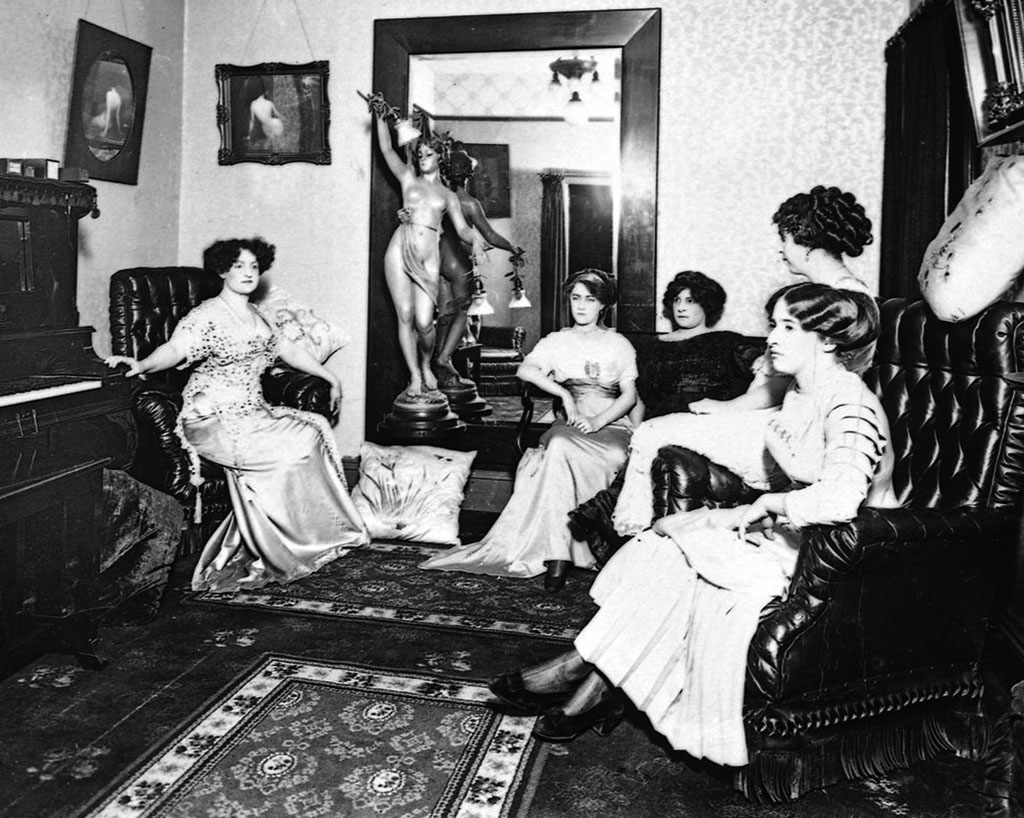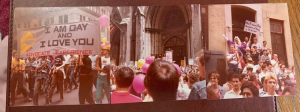(Photo credit to HistoryLink.org and Paul Dorpat: “Madam Lou Graham arrives in Seattle in 1888”)
Born in German in 1861, Lou Graham eventually made her way to Seattle around 1887 and became a local legend for her three-story brick bordello on Washington and Third, a courthouse today, and her home near Madison and 21st. Lou had a notable relationship with Amber Delmas, known as her housekeeper, whose daughter, Ulma Delmas, she would take as her own. When the city hit a moral panic, the pair and their daughter would leave for San Francisco, operating another bordello. In 1903, Lou Graham passed away from a stomach ulcer, her will to Ulma Delmas destroyed in a recent argument with Amber, leaving years of fighting over her properties.
In 1882, Robert Abrams acquired a property at Third and S. Washington. In 1885, he sold it to who he believed to be a man named Lou. Graham for $3000. Lou would move here around 1887 opening a successful bordello on the property. Local legends say more business was conducted there than city hall. Those interested can take the Seattle Underground Tour and see some of the history and surrounding buildings in person.
In June of 1889, the Great Seattle Fire would destroy the city, including Lou Graham’s property. She would be one of the first to rebuild, placing a three-story brick building which still stands today. Lou invested $22,000 to construct the structure. She would help others to rebuild, and during bank panics her deposits and loans to wealthy families helped rebound the “frontier” town.
The area, known today as Pioneer Square, was known then as the Whitechapel District, also sometimes referred to as the tenderloin district, redlight district, or restricted district. The neighborhood laid claim to many notable crimes, but also was the victim of misunderstandings. Wild accusations, like being the origin of the then-popular dance the Tango, would be used against the district because of its cultural diversity, being home to many BIPOC families. Dance halls, theaters, vaudeville performances, and gambling houses were common venues in the area.
The dance halls and bordellos of the district were persistently the subject of many headlines and local debates. Politicians and business organizations would discuss relocating the district, or removing it entirely. Police would regularly conduct raids, but under many administrations would work directly with the businesses, sometimes being paid off. Lou Graham would often be charged with operating without a liquor license. One attempt to prosecute her had a jury reach a not-guilty verdict within three minutes of deliberating.
Lou Graham would buy a property on Madison and 21st where she lived with Amber Delmas and their daughter Ulma Delmas. By 1902, the restricted district’s lines were changed during a moral panic. These divisions were known as the “deadline”, and Graham’s bordello was now outside of it. Lou would move with Amber and Ulma to San Francisco where its said they operated another similar facility. It is believed that Lou was to leave her properties with Ulma in her death but after an argument in their new home, Lou’s will to Ulma was destroyed.
Madam Lou Graham passed away in 1903, and her properties became contested by several parties as she had no will, leading to years of litigation. Robert Abrams, who sold her the land twenty years earlier, argued that because she was not a citizen that the sale of the deed was invalid and he was owed the property (he “generously” offered to pay the $3000 he received for the $85,000 valued property). Lou Graham attempted to become a citizen in 1894, which made the argument shaky. The county argued the state should take the property through escheatment, but the State of Washington itself had no interest in the property. German relatives also made claim to the property, which in 1907 would win a case in Washington’s Supreme Court and receive the property.
Ulma was placed under a caretaker who moved with her to Victoria, British Columbia, but the caretaker died two months after relocating. Ulma was then placed in a convent. Her father, Snyder, would end up kidnapping her and taking her back to Seattle, where she would eventually return to the Delmas family.
Lou Graham’s life is known today only from the histories of men around her, and her criminal records and headlines as a “head seamstress” at her parlor. Her relationship with Amber is not well documented and leaves room for ascertaining. However, Lou’s legends with LGBTQIA+ history go beyond her relationship with Amber. It is said that at least one of the women she hired was possibly a transgender woman, seen in the photograph as the lady in the black dress. Local rumors suggest that at Lou’s parlor men would request the lady in the black dress as a code for their interests.
See the archive on Madam Lou Graham.



Be First to Comment